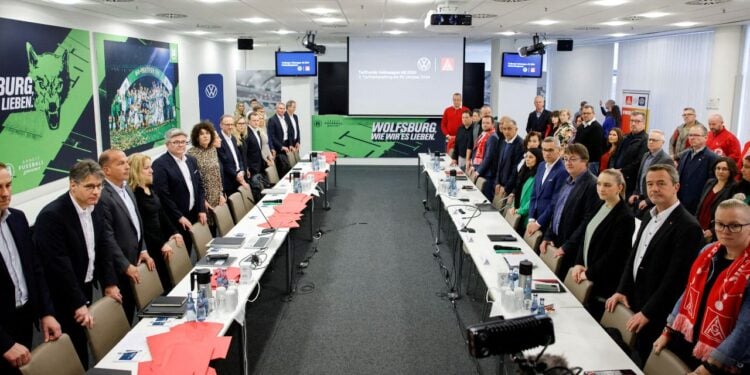Workers at German carmakers and engineering companies will receive a 5.5% wage increase over 25 months under a pilot deal struck with employers, the country’s largest industrial union said on Tuesday.
The agreement, hammered out after a marathon 18 hours of tough negotiations, is set to cover some 3.9 million employees at companies including Mercedes-Benz, BMW, Siemens and Thyssenkrupp, bringing to an end strikes by tens of thousands of workers.
Siemens welcomed the agreement, particularly that it will be in place for just over two years, offering the company planning security.
“Overall, the compromise reached on Nov. 12 is at the limit of what Siemens AG can take, but within our expectations,” said the spokesperson, who declined to comment on the deal’s financial impact.
The deal, watched by the European Central Bank for its effect on inflation, comes at a tough time for Europe’s biggest economy, which is heading into its second year of contraction engulfed by a government crisis.
Facing rising competition from Chinese manufacturers, some of Germany’s largest industrial firms, such as Volkswagen, are also asking for painful cuts.
Under the agreement, workers would get a wage rise of 2% from April 2025 and a further 3.1% from April 2026, said the IG Metall union’s local branches in Bavaria and the coastal region of Germany.
The rise, against a German inflation rate of 2.4% in October, falls short of the 7% increase sought by the union but is more than the employers’ offer of a 3.6% hike over a period of 27 months. In the previous round in late 2022, the sides agreed an 8.5% wage increase over two years.
The deal is usually adopted nationwide for workers in sectors covered by the talks.
Knut Giesler, the union negotiator for North Rhine-Westphalia, Germany’s most populous state, said the outcome was appropriate given the economic and political situation.
“It brings stability and security for employees and the economy…despite very different starting positions,” said Giesler, adding he would recommend his region accepts the deal.
VOLKSWAGEN IMPACT?
Economists welcomed a return to wage restraint in Germany which faces headwinds from trade tensions with China and uncertainty after the election of Donald Trump as U.S. president.
“This agreement signals a clear turnaround: away from strong wage increases to compensate for losses in purchasing power and towards job security,” said ING chief economist Carsten Brzeski.
“Whether this renewed wage restraint will really be able to secure jobs in the long term, however, remains to be seen in the light of economic developments.”
The agreement comes a week before a third round of negotiations over wages and plant closures at Volkswagen, which has asked workers at its namesake brand to take a 10% pay cut, arguing labor costs are way too high.
A spokesperson for VW’s works council welcomed the union agreement but declined to comment on any possible effect on its own talks, saying he would speak about that before the next round of negotiations on Nov. 21.
A VW spokesperson said the deal would apply to workers at its Osnabrueck plant, one of those widely seen as being at risk.
“We need cost relief, not a cost burden, and we have made proposals for this,” said the VW spokesperson.
The deal does, however, end the prospect of strikes in the wider sector after more than 70,000 union members demonstrated on Monday in support of the union’s demand or stopped work for a few hours.
Among the demonstrators were 15,000 staff at Volkswagen’s Audi division in the southern city of Ingolstadt, with BMW and MAN Truck & Bus, a unit of Traton, also affected.
Under the deal, employees would also get a one-off payment of 600 euros ($637) by February and allowances for trainees would rise by 140 euros per month in January, said IG Metall.
($1 = 0.9418 euros)
(Reporting by Alexander Huebner and Ilona Wissenbach; Additional reporting by Christina Amman; Writing by Madeline Chambers, Miranda Murray and Christoph Steitz; Editing by Friederike Heine, Kirsten Donovan and Tomasz Janowski)



 Dr. Gleb Tsipursky – The Office Whisperer
Dr. Gleb Tsipursky – The Office Whisperer Nirit Cohen – WorkFutures
Nirit Cohen – WorkFutures Angela Howard – Culture Expert
Angela Howard – Culture Expert Drew Jones – Design & Innovation
Drew Jones – Design & Innovation Jonathan Price – CRE & Flex Expert
Jonathan Price – CRE & Flex Expert















